Chapter 5 – Waste Prevention and Program Planning
The Utility’s Waste Prevention and Program Planning staff focus on reducing overall waste and increasing reuse, recycling, and composting using two key approaches: planning and data management and outreach and education. Staff members are responsible for developing and evaluating education and outreach programs, assisting the Collection Operations program and overall Utility planning.
The Waste Prevention Program includes three full-time equivalent (FTE) staff: two Senior Program Specialists and one Senior Planner. Responsibilities are divided so that each staff member focuses on specific program development and outreach activities for:
• Residential single and multifamily households and school education.
• Businesses, permitted events, and City government.
• Plans, policies, site plan review, and program development.
In addition to the three FTEs in the Waste Prevention Program, the Utility has a Program Assistant to provide administrative help utility wide and a Billing Specialist to perform all the commercial and drop box billing and some customer service, which is separate from the billing and customer service support performed by the City’s Utility Billing section of the City’s General Government Department.
This chapter describes Olympia’s waste prevention and program planning efforts and identifies education and outreach efforts by Thurston County staff that benefit Olympia customers.
Planning and Data Management
Waste ReSources tracks data on customers, tonnages, and operations to inform budgets, staffing decisions, annual work plans, and long-range plans. Chapter 3 and Appendix 2 (Cost of Waste Collection Services) highlight available data. While the Utility has extensive data on its own activities, it faces two key challenges that make it difficult to manage data and impossible to assess progress in total waste generated and total waste recycled.
First, while Olympia has a data management system, data are difficult to enter, manage, and extract. Some data is not easily gathered or in some cases impossible to gather because the Utility lacks a standalone work order and data management system specific to solid waste needs. With improved data systems, further operations-related data could be tracked.
Second, the Utility lacks data on self-hauled and privately collected materials including commercial recycling, composting, and construction and demolition debris. Staff can only estimate how many businesses, state agencies and other non-residential customers are recycling because their recyclables are collected by private haulers and data is not reported to the City. Data on quantities of waste self-hauled to the WARC by Olympia residents and businesses is not available, nor is waste collected by private haulers. Better reporting of this information would help with planning, public education and technical assistance programs, and evaluation of results.
Residential Engagement Efforts
Increasing diversion of recyclable and compostable materials is a major focus of the Prevention and Program Planning staff. In addition to conducting outreach campaigns, the Utility uses Recycle Coach, both for mobile and web, to make it easy for customers to find their collection schedule and recycling lists (Figure 24).
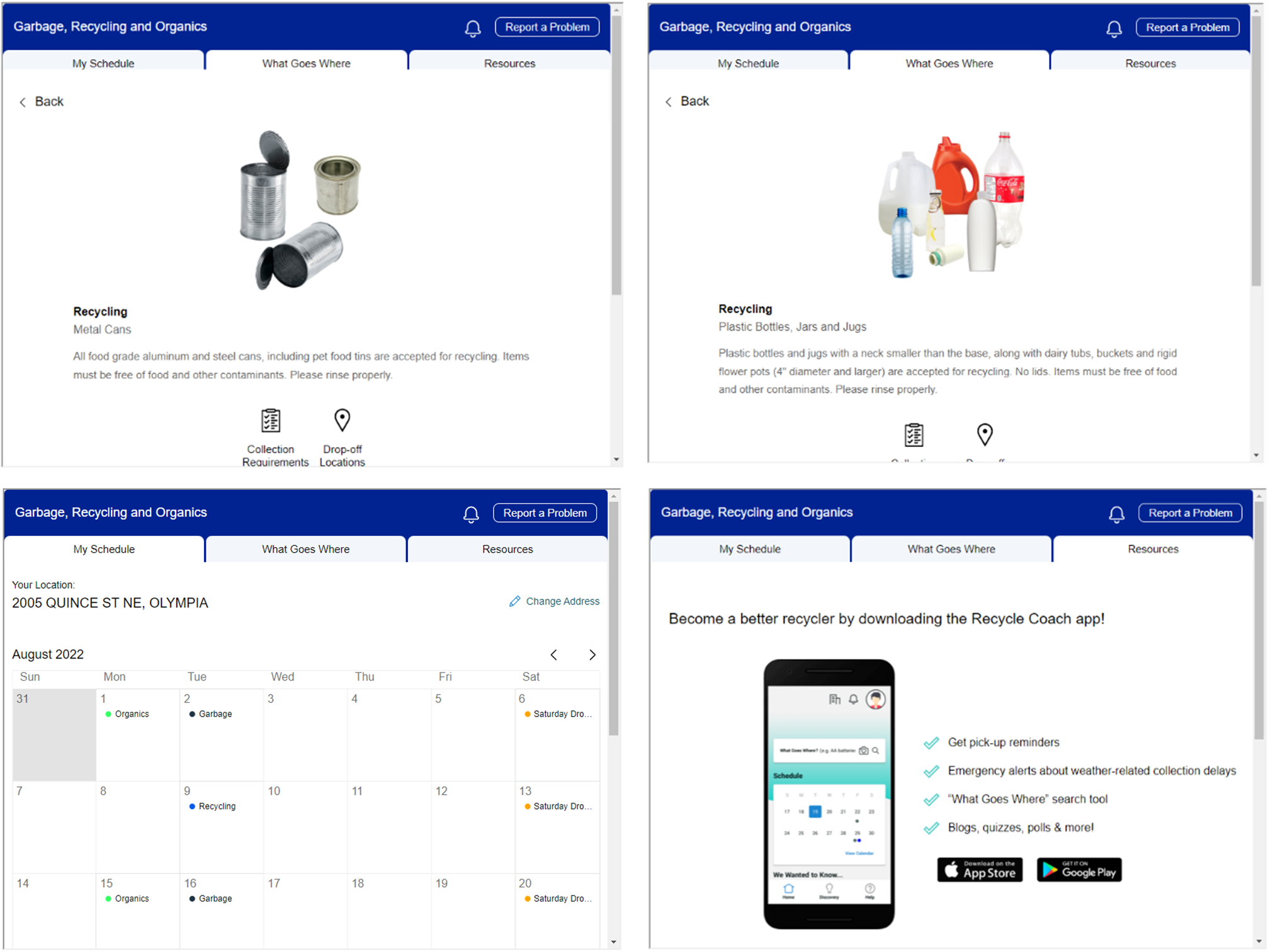
View Figure 24 Recycle Coach for Web
Single-Family Residential
The single-family residential program is well established and covers all three waste streams: garbage, recyclables, and organic materials. Education and outreach focus mostly on dissemination of information through an annual collection calendar, Utility bill inserts like the Five Things brochure, the Utility website, cart tags, and responses to customer inquiries. Information sessions are offered to neighborhood groups but are not well promoted or well attended.
Changes in recycling markets over the past several years have increased the importance of clean recycling with minimal contamination, especially in single-family settings. Cart tagging has become a mainstay of the anti-contamination campaign for recycling. Olympia’s cart tagging program uses municipal crews to routinely watch for and identify repeat contaminators through an iPad monitoring and reporting program. This process allows the Utility to receive cart tagging data while avoiding the need to allocate resources for dedicated cart inspectors. When needed, the Utility also uses dedicated cart tagging campaigns; for example, after removing glass from commingled recycling in 2021 (Figure 25).
Figure 25 Lid Lifts, Inspection, and Cart Tagging of Recycling Carts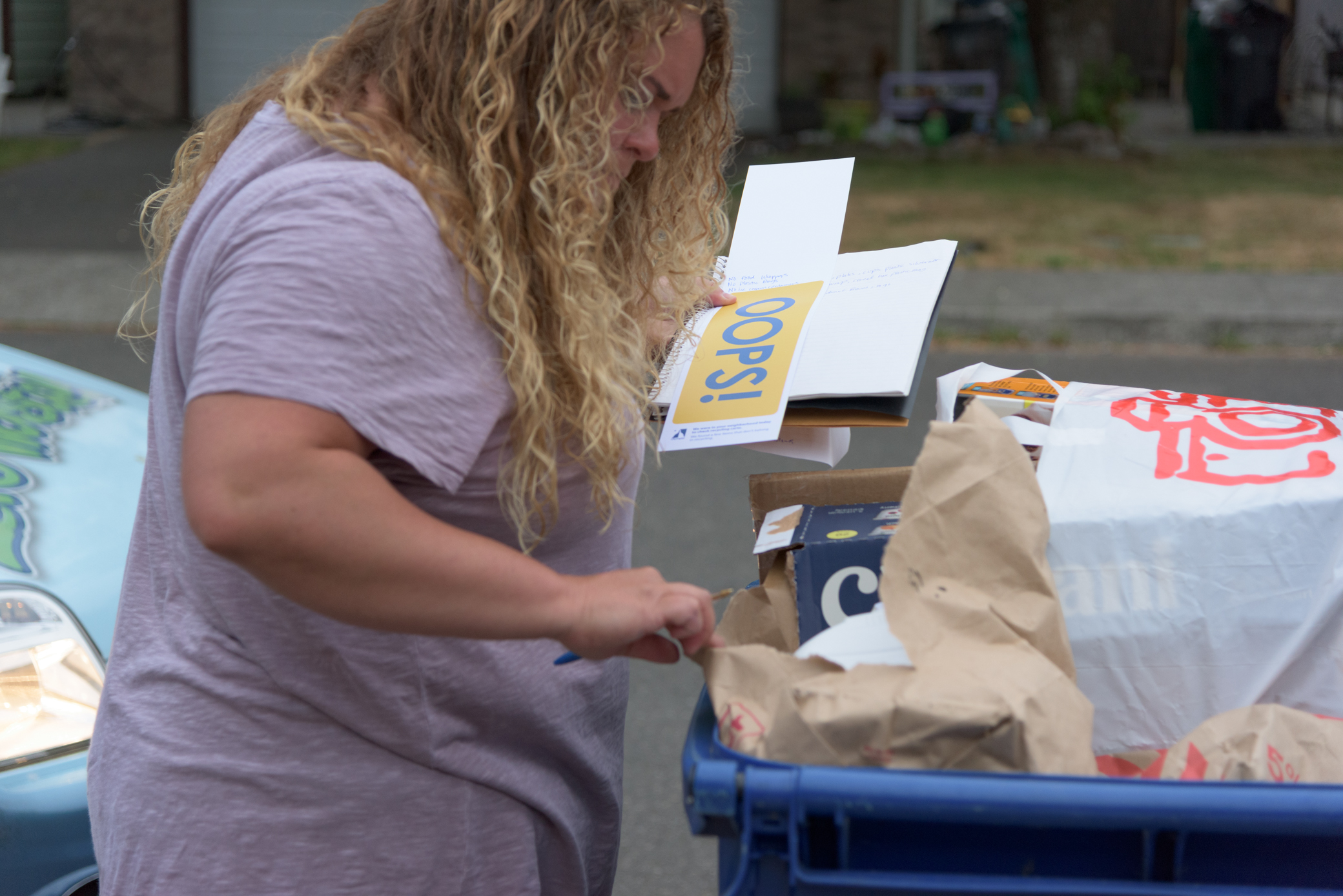
Source: Waste ReSources Staff
In 2021, Resource Recycling awarded the City of Olympia 2021 Program of the Year for its anticontamination efforts (Figure 26). The City also received the WSRA Recycler of the Year, Public Sector Education award for these same efforts.
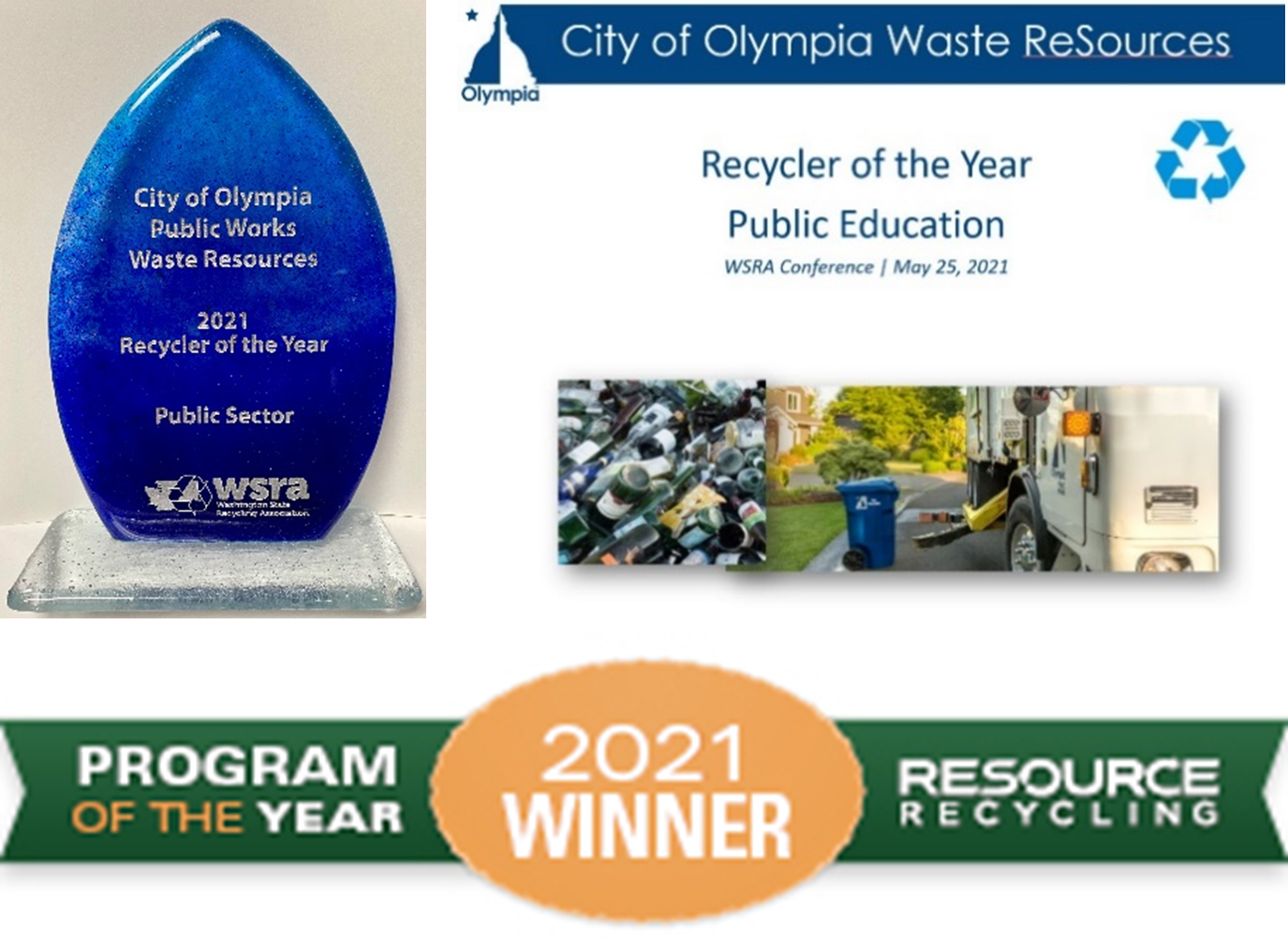
View Figure 26 City of Olympia Receives Recycling Awards from WSRA and Resource Recycling
Source: Waste ReSources Staff
Multifamily Residential
The complexes served by the Utility vary widely in terms of number and type of dwellings, configuration and space for garbage and recycle containers, socio-demographics of residents, and on-site or absentee management. Buildings with both residential and commercial tenants are called mixed-use buildings. Waste ReSources collects recyclable materials from residential units in mixed-use buildings, as part of the multifamily program. There has been an increase in mixed-use and larger multifamily waste collection.
Waste ReSources works with each customer to maximize recycling and diversion. Staff participates in the site plan review process to ensure adequate space for garbage, recycling, and organics containers. Figure 27 shows what happens when a site lacks adequate capacity. The City’s Engineering Development and Design Standards (EDDS) were revised most recently in 2021 to update standards for enclosures that allow new building construction to accommodate on-site recycling and diversion; however, opportunities remain to further improve the EDDS to support both collection safety and efficiency and waste recovery (see Appendix 1).
Figure 27 A Mixed-Use Building without Enough Capacity for Waste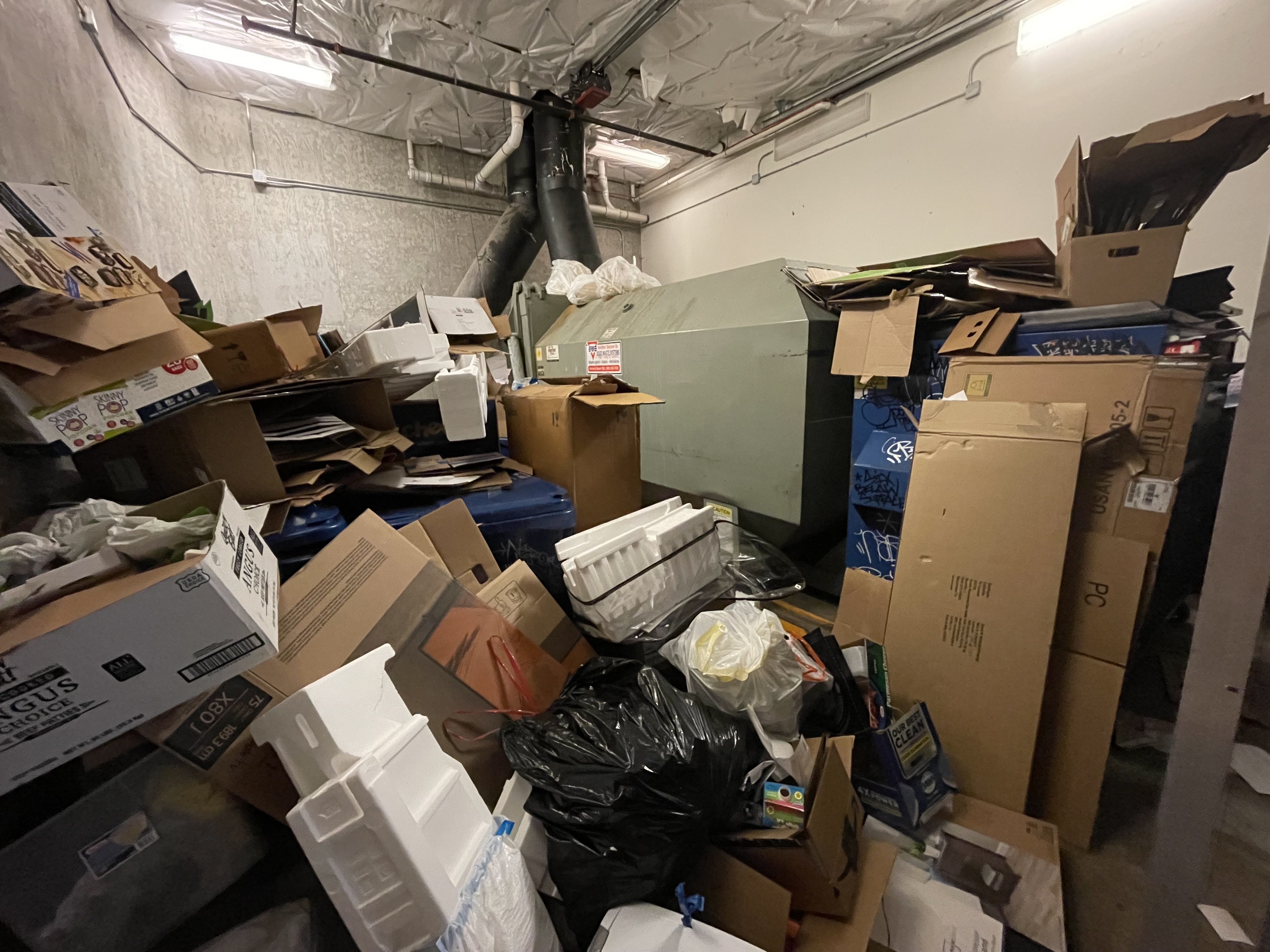
Source: Waste ReSources Staff
While the recycling rate for multifamily residential increased from 8% in 2005 to 15% in 2013, it decreased slightly to 14% in 2021. Challenges to multifamily recycling include limited space for containers, resident and manager turnover, insufficient capacity for recycling, and difficulty connecting with residents. The City maintains a list of multifamily addresses for direct mailings. Regular site visits by staff, resident information sessions, newsletters, web presence, and signage (Figure 28) have produced mixed results, indicating a need to evaluate and enhance efforts for these customers.
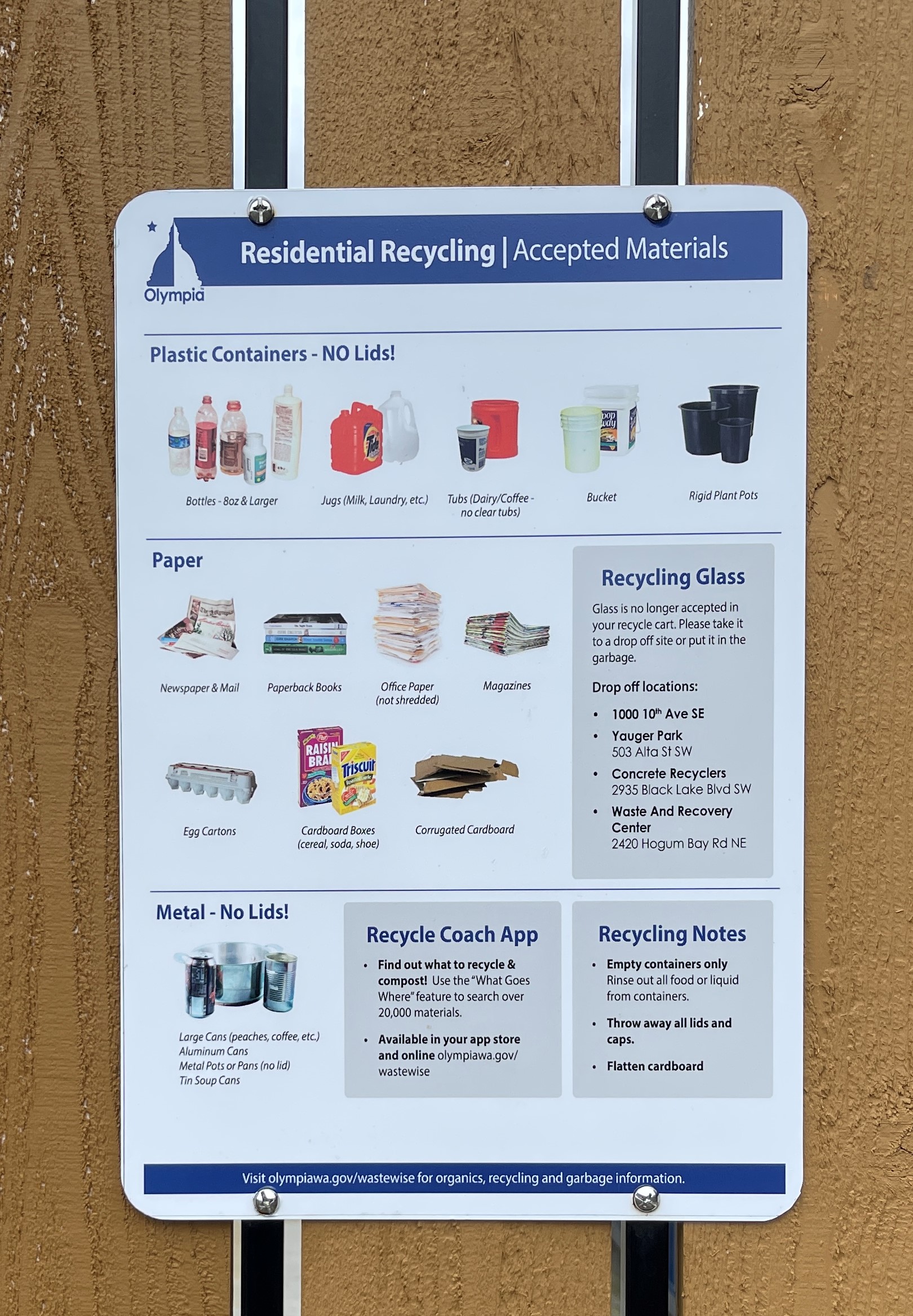
View Figure 28 Recycling Signage in Multifamily Buildings
Source: Waste ReSources Staff
Businesses, Schools, and City Government Efforts
Waste ReSources staff works with individual businesses, schools, and City departments to encourage waste reduction and increase collection of recyclable and compostable materials.
Businesses
The City began offering business technical assistance and free waste assessments in 2008, and since then has completed over 459 assessments. For a waste assessment, a staff member walks through the business with owners and managers to review their waste disposal practices, suggesting ways to save money on disposal by reducing waste and increasing recycling and composting. Recommendations can include subscribing to organics or recycling services, downsizing garbage service, and changing a purchasing or disposal practice. Waste assessments are promoted through cold calls, brochures, the Utility website, Utility bill inserts, direct mail, and a street banner. Waste assessments have resulted in more than 165 commercial organics customers.
Schools
The Waste Prevention Program launched a third-grade education program in 2007/2008. The OLYWAste Program offered hands-on education, both in the classroom and through field trips to the Dirt Works Demonstration Garden. At the start of the COVID-19 pandemic, Waste ReSources adapted school education to online learning by providing teachers with electronic educational materials and exercises to use in their lesson plans. Both in-classroom education and field trips are labor intensive for Utility staff, teachers, and parent volunteers. At present, there is not sufficient interest in or teacher and parent support to conduct in-classroom or field trips education, to resume these educational offerings. Waste ReSources continues to provide educational materials and lesson plans to interested teachers.
Before the pandemic, Waste ReSources also helped schools reduce waste by setting up curbside organics collection and encouraging the use of milk dispensers to eliminate disposable milk containers. The school organics collection program included 14 public schools, two private schools, and one community college. Waste ReSources continues to offer support on milk dispensers and organics collection to schools that are interested and have the internal sustainability and operations staff needed to support these programs.
City Government: Walking Its Talk
The City’s Waste ReSources Utility promotes and helps administer the City’s internal recycling program at 10 different City building locations where City staff work. The Utility has a unified approach to collection and education, both inside and outside of City buildings. All City employees are given a blue desk-side recycle bin with a mini-bin for garbage. Common areas such as lunchrooms, meeting rooms, copy centers, and conference rooms have centralized collection points for bottles, cans, and paper. Organics collection is offered at City buildings for employee use while drop box at the City’s Maintenance Center gives Waste ReSources crews a place to deposit scrap metal for recycling. Styrofoam block is collected and taken to Dart Container. Plastic film is collected for recycling, picked up by the Olympia Lions Club, and sent to Trex to be recycled into benches placed locally. Battery recycling is available in a few City buildings and processed locally.
Public Permitted Events
Throughout the year, Olympia offers additional opportunities for recycling and waste reduction. Some of the opportunities are annual, and others are short-term grant-funded projects and programs. Waste ReSources provides garbage, recycling, and organics collection at permitted and large non-permitted public events. Prior to the COVID-19 pandemic, there were over 50 recycling events annually, including three major events—Wooden Boat Festival, Lakefair, and Harbor Days—and many smaller events. Only 16 events were held in 2020 and even fewer (12) in 2021. The number of events in 2022 is expected to be about 25.
Figure 29 Zero Waste Trailer (exterior and interior)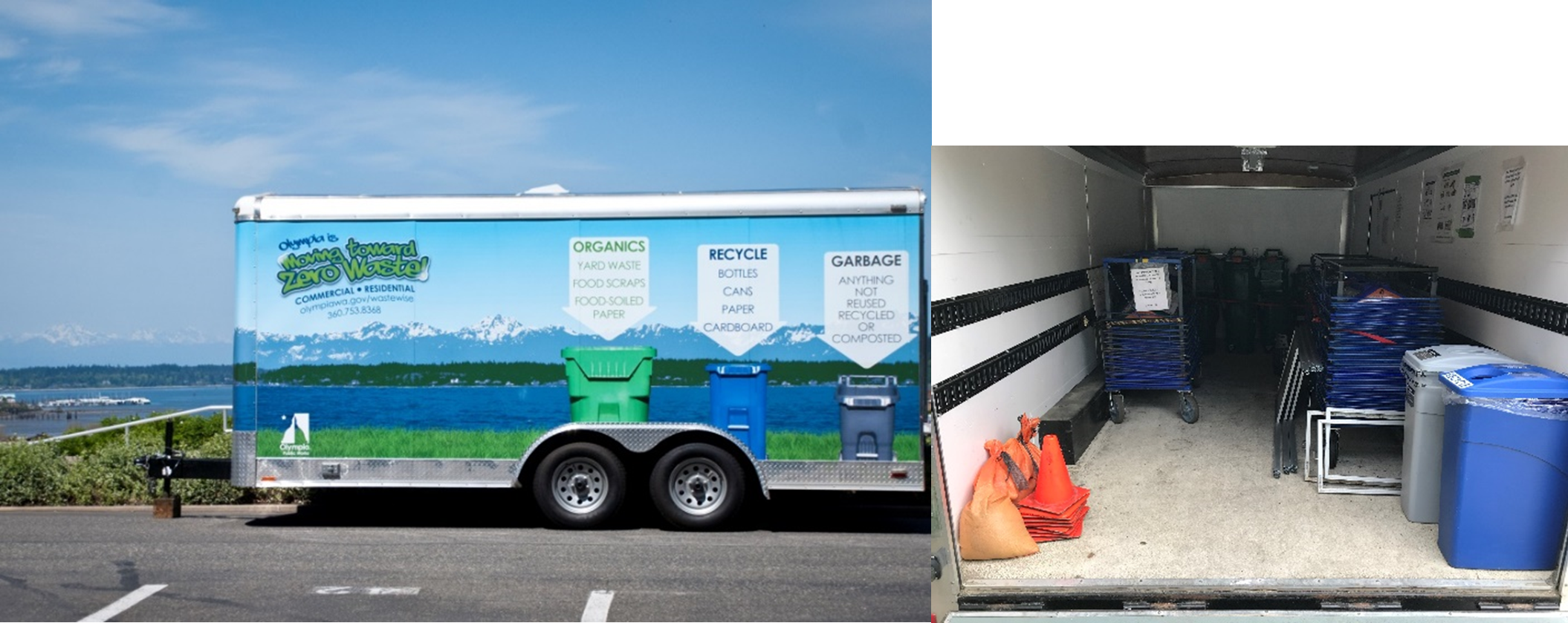
Source: Waste ReSources Staff
Olympia requires festival and event organizers on City property to obtain a permit and present a waste plan. Public event organizers are strongly encouraged to borrow recycling and compost containers from Waste ReSources to collect plastic bottles, aluminum cans, cardboard, and food waste. If organizers recycle, the Utility charges only garbage tip fees and not recycling, organics, or hauling fees. Event organizers are encouraged to participate in organics collection for food service vendors and the public. For large events, Waste ReSources enters into an agreement with organizers and delivers a zero waste trailer (Figure 29) with materials to support recycling, including recycling signs, bags, and frames that hold the bags. The organizer must also arrange with the Utility for a dumpster or other container to consolidate recycling for later collection.
Efforts by Thurston County
Thurston County conducts outreach through residential, business, community, and public information outlets. This is accomplished residentially by outreach in both single and multifamily areas. Businesses are offered technical assistance while communities receive outreach and presentations for different groups and organizations about waste reduction. The County also maintains a “where do I take myÖ?” database to help residents and businesses know what and where to recycle (Figure 30).
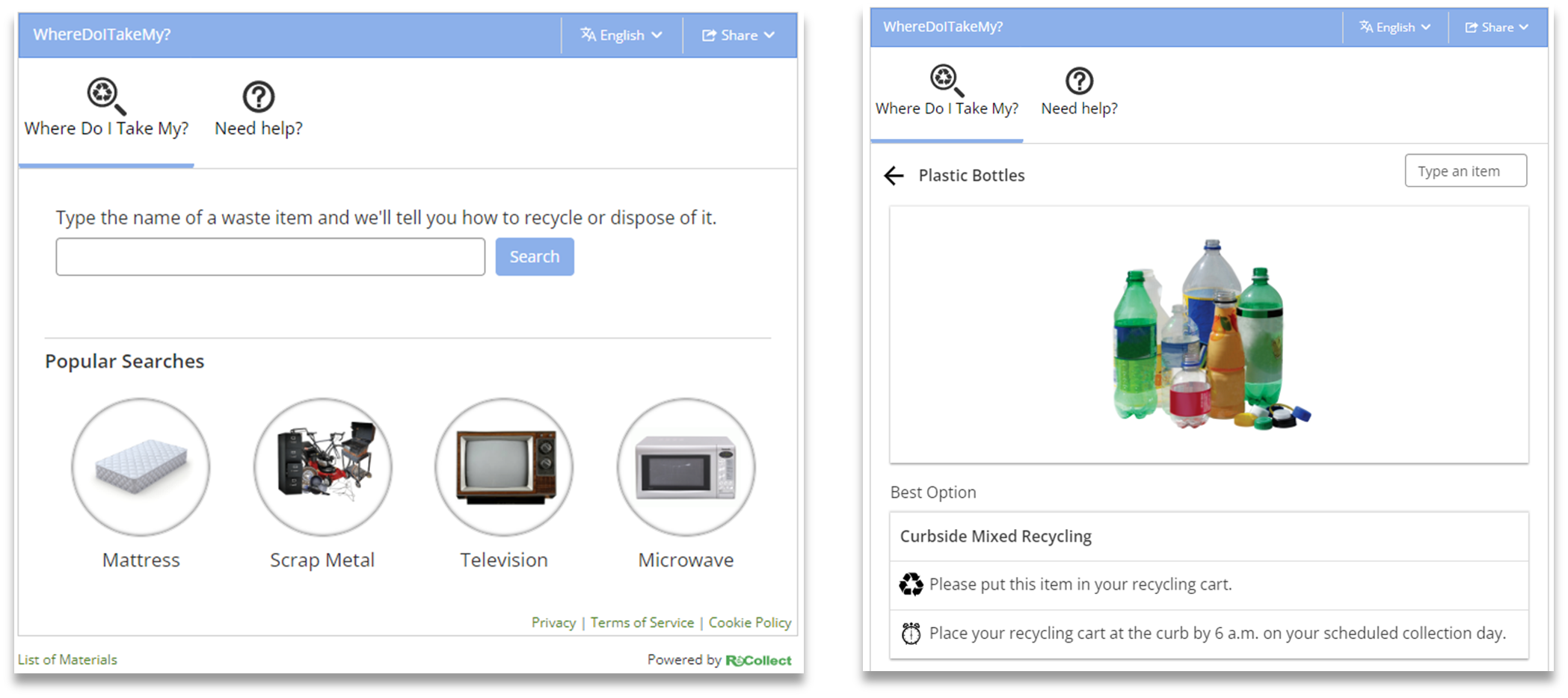
View Figure 30 Thurston County ReCollect App and “where do I take my...?” Database


